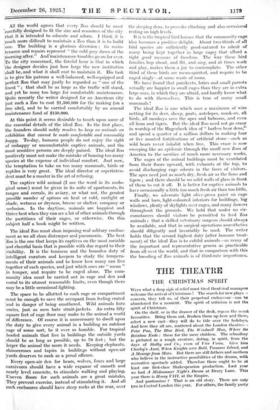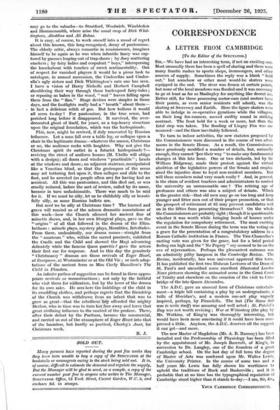THE THEATRE
THE CHRISTMAS SPIRIT
Wiru what a deep sigh of relief must tired theatrical managers welcome the arrival of Christmas ! The search for new plays— concern, they tell us, of their perpetual endeavour--can be abandoned for a moment. The spirit of criticism is not the spirit of Christmas. - On the shelf, or in the drawer of the desk, repose the usual favourites. Bring them out, freshen them up here and there, select a new cast—they will do to tide over the holidays. And here they all are, scattered about the London theatres— Peter Pan, The Blue Bird, The Windmill Man, Where the Rainbow Ends : these for the mere children. The schoolboy is pictured as a rough creature, dating, in spirit, from the days of Stalky and Co., even of Vice Versa. Give him Charley's Aunt, When Knights were Bold, Treasure Island, and A Message from Mars. But there are still fathers and mothers who believe in the instructive possibilities of the drama, with recreative spectacle added. Therefore there ought to be at least one first-class Shakespearian production. Last year we had A Midsummer Nights Dream at Drury Lane. This year there is Henry VIII. at the Empire. And pantomime ? That is an old story. There are only two in Central London this year. For others, the family party may go to the suburbs—to Stratford, Woolwich, Wimbledon and Hammersmith, where arise the usual crop of Dick W hit- tingtons, Aladdins and All Babas.
It is easy, of course, to work oneself into a mood of regret about this known, this long-recognized, decay of pantomime. The elderly critic, always romantic in reminiscence, imagines himself to be again as he was when infantile fancy was cap- tured by gnomes leaping out of trap-doors ; by Joey scattering crackers ; by fairy ladies and corpulent " boys," interspersing the knockabout with touches of sweet sentimentality. Out of respect for vanished players it would be a pious task to catalogue, in annual succession, the Cinderellas and Cinder- ella's ugly sisters and Dick Whittington's cats one has seen. I have a vision of Harry Nicholls and Herbert Campbell shouldering their way through these burlesqued fairy-tales ; or reposing as babes in the wood, " real " leaves falling upon them from the " flies." Stage devices were simpler in those days, and the footlights really had a " breath" about them— in fact a delicious relish of gas. But how tedious it would all seem to-day S For pantomime, in the true sense, had perished long before it disappeared. It survived, the over- decorated ghost of itself, for years, as a top-heavy structure upon the original foundation, which was the harlequinade.
This, now, might be revived, if duly renovated by Russian influence. Let a man fall over a table leg, or collapse upon a chair in the legitimate drama—whatever the season, Christmas or no, the audience rocks with laughter. Why not give the Christmas spirit its outlet in a futurist harlequinade ?- reviving the street of uniform houses (M. Utrillo will oblige with a design); all doors and windows " practicable " ; heads at the windows and doors ; an adjacent staircase, manipulated like a Venetian blind, so that the grotesques of the scene may set tottering feet upon it, then collapse and slide to the foot, and be arrested (as people often are) for having had an accident. All this was pantomime, and this died out, or was cruelly reduced, before the sort of review, called by its name, became in turn unfashionable. There was much to be said - for it. If we must be silly, let us be childishly silly or beauti- fully silly, as some Russian ballets are.
But need we be silly at Christmas time ? The learned and grave will remind us of the solemn dramatic associations of this week—how the Church silenced her ancient fear of mimetic shows, and, in her own liturgical plays, gave us the " origins " of all that followed in the drama of the Eliza- betluins : miracle plays, mystery plays, Moralities, Interludes. From these, undoubtedly, our drama comes—straight from the " amateurs " who, within the sacred precincts, exhibited the Cradle and the Child and showed the Magi advancing delicately while the famous Quern quceritis ? gave the actors their first cue for response. And to this day the genuinely " Christmassy " dramas are those revivals of Eager Heart, of Evwyman, at Westminster or at the Old Vic ; or such adap- tations of the ancient form as Miss Cicely Hamilton's The Child in Flanders.
An infinite pathos- of suggestion can be found in these appro-
priate revivals or reconstructions ; not only by, the faithful who visit them for edification, but by the lover of the drama for its own sake. He sees here the babblings of the child in its swaddling clothes, and perhaps regrets that the friendship of the Church was withdrawn from an infant that was to , grow so great—that the rebellioneft offended the mighty
Mother, who in time was to turn h'ex.face away and leave that great civilizing influence to the control of the profane. These, after their defeat by the Puritans, became the commercial, and carried us out of the atmosphere of Eager Heart into that of the harmless, but hardly so poetical, Charley's Aunt, for Christmas week.
R. J.







































 Previous page
Previous page